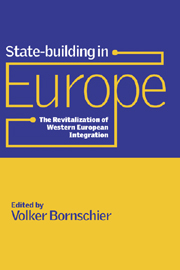Book contents
- Frontmatter
- Contents
- List of figures and tables
- List of contributors
- Preface
- Acknowledgements
- Part I State-building and Political Entrepreneurship
- Part II The Core Elements in Recasting the European Bargain
- 3 The origins of the Single Market
- 4 Esprit and technology corporatism
- 5 EC regional policy: monetary lubricant for economic integration?
- 6 EC social policy: the defeat of the Delorist project
- Part III Conclusions beyond the Single European Act of 1986
- Appendix List of interview partners
- Bibliography
- Index
4 - Esprit and technology corporatism
Published online by Cambridge University Press: 10 October 2009
- Frontmatter
- Contents
- List of figures and tables
- List of contributors
- Preface
- Acknowledgements
- Part I State-building and Political Entrepreneurship
- Part II The Core Elements in Recasting the European Bargain
- 3 The origins of the Single Market
- 4 Esprit and technology corporatism
- 5 EC regional policy: monetary lubricant for economic integration?
- 6 EC social policy: the defeat of the Delorist project
- Part III Conclusions beyond the Single European Act of 1986
- Appendix List of interview partners
- Bibliography
- Index
Summary
Framing the question
The Single European Act of 1986 incorporated a new Article enshrining the Commission's power to enact technology policy. This chapter examines the roots of this change in the European political economy. We have focused on the creation of the European Strategic Programme of Research and Development (Esprit) in the early 1980s because we believe that it was through the creation of this programme that the Commission won the right to be active in the field of technology policy. The later inclusion of a specific article in the revised treaties can be seen as a case of formalizing an existing practice.
Furthermore, we will analyse this policy initiative in order to determine whether or not, in both its design and execution, Esprit may be said to constitute an incidence of technology corporatism, a concept that has already been briefly introduced in chapter 1. The issue that concerns us here is from where or from whom the new initiative in the realm of technology policy came and which interests were behind it. In this way it addresses the notion that political entrepreneurs heard the call of European transnational firms to improve the offer ‘Europe’ as a condition for their remaining in Europe – which was phrased more along the lines of ‘this is what needs to happen in our economic, social and political system if we are to be able to succeed in the international economy’.
- Type
- Chapter
- Information
- State-building in EuropeThe Revitalization of Western European Integration, pp. 93 - 121Publisher: Cambridge University PressPrint publication year: 2000
- 2
- Cited by



